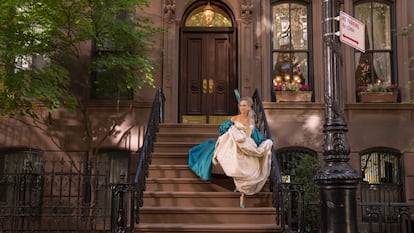Carrie Bradshaw’s iconic stoop in ‘Sex and the City’ closed by owner tired of tourists
Barbara Lorber is fed up with the fact her West Village home has been a ‘global tourist destination’ for nearly 30 years. Now, city authorities have granted her permission to block the entrance with a metal gate


Carrie Bradshaw, in her Manolo Blahniks, walked up the stairs of 66 Perry Street in Manhattan’s West Village countless times during the six seasons of the iconic Sex and the City series. She did the same in the two follow-up films and in And Just Like That, the sequel to the series, the third season of which is currently being filmed. While the four-story brownstone is similar to many others in this New York neighborhood, legions of fans — both of the series and of Sarah Jessica Parker, who portrays the beloved character — have long recognized the building. For nearly 30 years — Sex and the City premiered on June 6, 1998 —, they’ve flocked to take photos, admire the structure, and recreate scenes of Carrie Bradshaw, always in her signature heels, on the stairs of her apartment.
That is, until now. The building’s owner, identified by The New York Times as Barbara Lorber, has grown weary of her property being a “global tourist destination” and, with the approval of New York authorities, she will soon block access to what she refers to as “her celebrity staircase” with a metal gate.
The building at 66 Perry Street, built in 1866 and owned by Barbara Lorber since 1978, has become a must-see stop on many New York tours, and as a result, is often overcrowded with tourists. “At any hour of the day or night, there are groups of visitors in front of the house taking flash photos, engaging in loud chatter, posting on social media, making TikTok videos, or just celebrating the moment,” Lorber explains in a letter submitted on Tuesday, January 14, to a public hearing of the New York Landmarks Preservation Commission.
In the document, obtained by The New York Times, Lorber calls for “protection” that has been delayed for “decades.” “After 20-plus years of hoping the fascination with my stoop would die away and fans would find a new object for their devotion, I have acknowledged we need something more substantial. In order to regain a reasonable quality of life for our tenants and ourselves: we need to install a proper gate,” argues Lorber, who lives in the building with two other families.
Authorities have already granted Lorber permission to install a gate, which, according to the letter, “adhere to the existing authentic historic style” of Greenwich Village, the district in which the building is located.
The evidence of Lorber’s weariness with the situation is currently a chain at the foot of the stoop that restricts access. Hanging from the chain is a sign reading “Private Property.” Several other signs ask visitors not to make noise, not to climb the stairs, and suggest that those taking selfies donate money to animal shelters. But it has not been enough to hold back the tourists.
Many visitors “climb over the chain, pose, dance or lie down on the steps, climb to the top to stare in the Parlor windows, try to open the main entrance door, or, when drunk late at night, ring the doorbells,” the owner complains in her letter. “We’ve also had graffiti painted on the steps.” Lorber also has the support of her neighbor across the street, who reported receiving threats when calling out tourists.

“I think it’s better for the photos and videos, for her and her privacy, and the gate will be better than the chain, because all the houses around here have them,” says Angela Guerra, a Sex and the City fan from Texas, in statements collected by Spanish new agency EFE. Even so, she adds that she “had to see” Carrie’s house before leaving the city. Her friend, Charlie Talmer, agrees that the gate is a “prudent” security measure, with no “bad intentions for the fans.” “I don’t doubt that there are some people who try to go up, make noise, and it could be dangerous,” he adds.
In her letter, Lorber offers a mea culpa regarding the building’s fame: “At the time, no one knew the show would turn into anything long lasting... much less, the iconic fantasy vehicle and touchstone for NYC’s magic that it has become,” she writes. “My fault: I felt sorry for the young location scout who was a recent grad from NYU Film School. He told me if he didn’t secure THIS house, he would lose his first real job in the business.”
“Take all the pictures you wish standing on the street,” adds Lorber. “But please don’t climb into our space and into our windows.”
After the gate is installed, it remains to be seen whether Carrie Bradshaw’s apartment will continue to be a tourist attraction for fans who associate the steps with the star’s style, glamour, and independence.
@christina.kremidas Would you pay $3,600 to live in Carrie Bradshaw’s building? ✨ #newyork #westvillage #realestate #agent #satc #andjustlikethat #sarahjessicaparker #nyc
♬ Sex and the City (Main Theme) - TV Sounds Unlimited
Carrie Bradshaw’s apartment is not the first location to fall victim to mass tourism driven by movies and TV shows. A similar fate befell the sandy beach of Maya Bay, on the island of Ko Phi Phi Lee in Thailand. The beach gained worldwide fame in 2000 after being featured in The Beach, starring Leonardo DiCaprio. After attracting up to 5,000 visitors a day, local authorities decided to close it temporarily for the first time in 2018 to protect its fragile ecosystem. The Thai paradise reopened to tourists on October 1, 2024, following a two-month closure. Other destinations, including Santorini (Greece), Bagan (Myanmar), Machu Picchu (Peru), and Chichén Itzá (Riviera Maya, Mexico), have also responded to mass tourism by restricting visitor access.
Sign up for our weekly newsletter to get more English-language news coverage from EL PAÍS USA Edition
Tu suscripción se está usando en otro dispositivo
¿Quieres añadir otro usuario a tu suscripción?
Si continúas leyendo en este dispositivo, no se podrá leer en el otro.
FlechaTu suscripción se está usando en otro dispositivo y solo puedes acceder a EL PAÍS desde un dispositivo a la vez.
Si quieres compartir tu cuenta, cambia tu suscripción a la modalidad Premium, así podrás añadir otro usuario. Cada uno accederá con su propia cuenta de email, lo que os permitirá personalizar vuestra experiencia en EL PAÍS.
¿Tienes una suscripción de empresa? Accede aquí para contratar más cuentas.
En el caso de no saber quién está usando tu cuenta, te recomendamos cambiar tu contraseña aquí.
Si decides continuar compartiendo tu cuenta, este mensaje se mostrará en tu dispositivo y en el de la otra persona que está usando tu cuenta de forma indefinida, afectando a tu experiencia de lectura. Puedes consultar aquí los términos y condiciones de la suscripción digital.








































